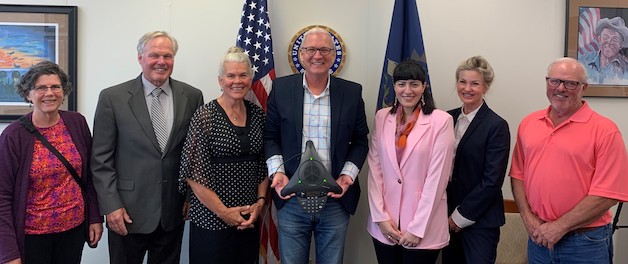
Sen. Kevin Cramer (R-ND) shared this photo of a meeting with North Dakota CCL volunteers in August 2023, where they discussed the PROVE IT Act.
PROVE IT Act passes Senate committee after months of CCL support
By Flannery Winchester
On January 18, the bipartisan PROVE IT Act passed the Senate Environment and Public Works Committee with a bipartisan majority vote of 15-4. How did it achieve this exciting milestone? With a boost from CCL, of course!
The bill would require the Energy Department to study the amount of carbon pollution released in the making of certain products made in the U.S., and to compare that to certain other countries. “PROVE IT” actually stands for Providing Reliable, Objective, Verifiable Emissions Intensity and Transparency.
We were keen to support this bill because it is an important step to using America’s trade policy to drive down global emissions. With this bill, Sen. Kevin Cramer (R-ND) explains, “Verifiable data will be a useful tool for our government to build the bonds amongst our allies while putting a spotlight on global polluters and adversaries like China and Russia.”
“If you believe China and India need to be dealt with to really get global emissions down, this is the way to do it,” cosponsor Sen. Lindsey Graham (R-SC) agreed.
Let’s take a look back at this policy and how our support helped advance the bill.
Introduced with fanfare
Just days before CCL’s annual summer conference, on June 7, 2023, a bipartisan group of Senators introduced the PROVE IT Act in the Senate: Lead sponsor Sen. Chris Coons (D-DE) was joined by Sens. Kevin Cramer (R-ND), Bill Cassidy (R-LA), Lindsey Graham (R-SC), Martin Heinrich (D-NM), John Hickenlooper (D-CO), Angus King (I-ME), Lisa Murkowski (R-AK), and Sheldon Whitehouse (D-RI).
The Washington Post covered the introduction of the bill, speaking to CCL’s VP of Government Affairs Ben Pendergrass for the story. Ben weighed in on how the bill might move forward toward becoming law. Washington Post columnist Catherine Rampell gave her positive take on the legislation a few days later, calling the bill “an achievement in its own right.”
Since the introduction came just before our lobby day, CCL’s legislative staff included the bill as another option for a primary ask. Many of our 436 meetings on Capitol Hill included discussions of the bill, and at our lobby day reception that night, Rep. Scott Peters (D-CA-50) announced his intention to introduce a House version of the bill.
CCL volunteers spring into action
In July, we mobilized in support of the PROVE IT Act. Across the country, our supporters contacted their congressional offices in support of the Senate bill and to encourage the introduction of a House version.
We set a goal of 5,000 messages in support of the PROVE IT Act. True to form, CCL supporters blew that out of the water! Between July 11 and August 5 last year, we sent 14,666 messages to Congress about the PROVE IT Act.
By the fall, two more Senators had jumped on the bill as cosponsors: Sen. John Boozman (R-AR) and Sen. Dick Durbin (D-IL).
Support in local media, education across the country
In early August, some of our Delaware volunteers — Peggy Schultz, Beth Chajes, Marty Hopkins, Charlie Garlow, and Phil Smith — wrote an op-ed about the PROVE IT Act, showing support for their Senator and the bill’s lead sponsor, Sen. Chris Coons. “This bipartisan bill will account for industrial carbon emissions — and help Delaware,” the headline reads.
When the piece was published, it caught the eye of another cosponsoring senator from a different state. That senator’s staff reached out to CCL’s legislative staff to say they had seen the op-ed, they really liked it, and they appreciated the education volunteers were doing about the PROVE IT Act in their community.
Over in North Dakota, constituents of Sen. Kevin Cramer (the other main sponsor of the bill) were also hard at work in their local media. Volunteer Moones Alamooti published a letter in the Jamestown Sun titled, “Prove It Act has many potential benefits for North Dakota.” Moones wrote that the legislation “represents a balanced approach to addressing climate change with the potential to bring about positive outcomes for North Dakota’s economy and environment.”
At the national level, CCL’s social media accounts continued to educate the public and generate more outreach to Congress in support of the legislation with explainer posts like this one:
View this post on Instagram
And of course, we wouldn’t be CCL if we didn’t sink our teeth into all the nerdy details 🤓 In August, CCL Research Coordinators Dana Nuccitelli and Rick Knight presented a volunteer training about the PROVE IT Act in the context of other trade and climate policy. Then earlier this January, Dana touched on the PROVE IT Act again when updating us about proposed carbon border adjustment and carbon tariff bills.
Targeted mobilization supported a successful markup
On Jan. 10, the Senate Environment and Public Works (EPW) Committee announced their plans to mark up and vote on the PROVE IT Act as soon as the following week. By Jan. 11, CCL staff had organized and launched a targeted mobilization for volunteers in the 19 states with senators on the EPW Committee.
With our online action tool and script, volunteers placed 194 calls to committee members. Two of those committee members who received calls, Sen. Alex Padilla (D-CA) and Sen. Mark Kelly (D-AZ), signed onto the bill as cosponsors less than a week after our mobilization began.
Then on Jan. 18, the committee marked up and voted on the bill. It passed on a bipartisan basis, earning even more Republican support than expected. E&E News characterized the support from Sen. Cynthia Lummis (R-WY) and Sen. John Boozman (R-AR) as “something of a surprise.”
Not to us — we know that when enough constituents ask their lawmakers to act, it moves the needle!
We will keep you updated about the next steps for the PROVE IT Act and how you can support its progress. Stay tuned!





